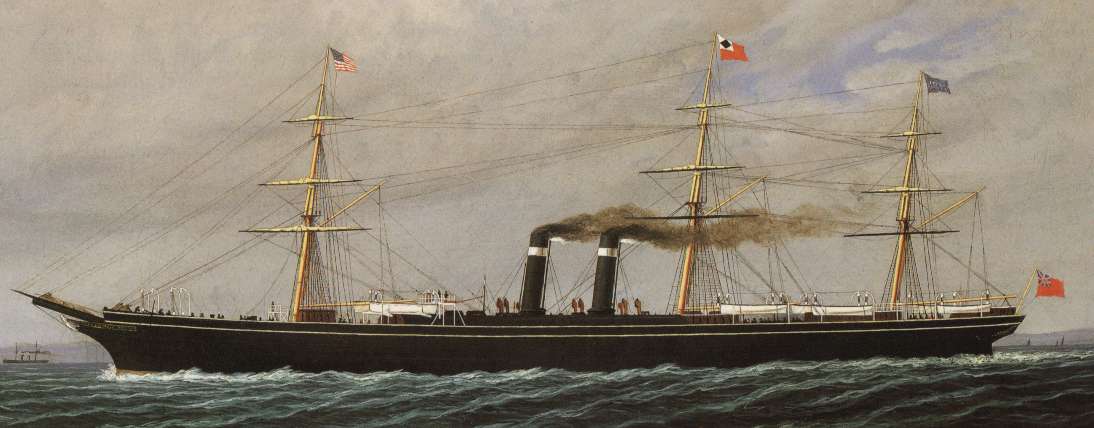History > Settlement in North America
Settlement in North America
Based on favorable reports from the scouts sent to America in 1874 and through the personal experiences and encouragement of Rev. Stärkel from the colony of Norka, several families began their journey to the United States in 1875.
The steamship City of Brussels arrived in New York from Liverpool on June 28, 1875. Onboard was a small party of Volga Germans, including seven families and two single men who were the first Volga Germans to migrate to the United States. Some of these families would be the first to settle in Portland only a few years later.
The steamship City of Brussels arrived in New York from Liverpool on June 28, 1875. Onboard was a small party of Volga Germans, including seven families and two single men who were the first Volga Germans to migrate to the United States. Some of these families would be the first to settle in Portland only a few years later.
This first group initially settled in Bluffton, Ohio, and worked for two years digging ditches and other similar tasks among the community's farmers. During this two-year period, they were looking for land which they later found in Sutton, Nebraska. The Friedrich Jörg and Heinrich Trüber families may have been the first to move to Sutton.
According to Dr. Ruth Schultz, George and Elizabeth Schreiber were the parents of the first child (Helena) of Volga German descent born in America. George was the son of Heinrich Schreiber and traveled with his parents and the first group of immigrants aboard the City of Brussels.
A second group of Volga German families arrived together in New York on December 30, 1875, aboard the steamship Montreal. This group initially settled in Kansas. Among this group would be the first Volga Germans to arrive in Albina in 1881.
The Volga Germans were different from earlier German immigrants. Their speech was laced with Russian words and German-Americans considered their dialect archaic. Along with their English-speaking neighbors, They started life in America at the bottom of the social and economic ladder and did jobs that others avoided. Women worked as domestics; men labored on railroad construction projects or farmed. All who encountered them, however, admired their ability to work.
By the early 1880s, some of those who had initially settled in the Midwest began to migrate to the Pacific Northwest and Portland, Oregon.
Beginning with a few scouts who located inexpensive and abundant land in 1874, German migration from Russia eventually reached massive proportions. By 1920, 303,532 first and second-generation German Russians resided in the United States.
According to Dr. Ruth Schultz, George and Elizabeth Schreiber were the parents of the first child (Helena) of Volga German descent born in America. George was the son of Heinrich Schreiber and traveled with his parents and the first group of immigrants aboard the City of Brussels.
A second group of Volga German families arrived together in New York on December 30, 1875, aboard the steamship Montreal. This group initially settled in Kansas. Among this group would be the first Volga Germans to arrive in Albina in 1881.
The Volga Germans were different from earlier German immigrants. Their speech was laced with Russian words and German-Americans considered their dialect archaic. Along with their English-speaking neighbors, They started life in America at the bottom of the social and economic ladder and did jobs that others avoided. Women worked as domestics; men labored on railroad construction projects or farmed. All who encountered them, however, admired their ability to work.
By the early 1880s, some of those who had initially settled in the Midwest began to migrate to the Pacific Northwest and Portland, Oregon.
Beginning with a few scouts who located inexpensive and abundant land in 1874, German migration from Russia eventually reached massive proportions. By 1920, 303,532 first and second-generation German Russians resided in the United States.
Sources
Sallet, Richard. Russian-German Settlements in the United States. Fargo: North Dakota Institute for Regional Studies, 1974. Print.
Scheuerman, Richard D., and Clifford E. Trafzer. The Volga Germans: Pioneers of the Northwest. Moscow, ID: U of Idaho, 1980. Print.
Scheuerman, Richard D., and Clifford E. Trafzer. The Volga Germans: Pioneers of the Northwest. Moscow, ID: U of Idaho, 1980. Print.
Last updated October 21, 2023
